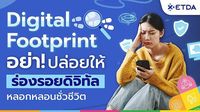In the digital age where every click, post, and like leaves a trace, understanding our digital footprint is more important than ever. The Electronic Transactions Development Agency (ETDA) aims to educate the Thai population on the implications of their online behavior through the Digital Citizen (EDC) project. The initiative seeks to empower individuals to manage their digital footprint wisely and safely.
Digital footprints can be divided into two categories: passive and active. A passive digital footprint encompasses data that is automatically collected by websites and apps without the user's direct input. For instance, browsing history and search history are compiled without any specific action from the user, alongside cookies and IP addresses that track user behavior. This data, although not actively shared, can be utilized for marketing purposes and may shape the advertisements seen by users.
On the other hand, an active digital footprint consists of the information that individuals intentionally share online. Social media posts, reviews, emails, and profiles created on various platforms fall under this category. This information reflects personal interests and opinions, often leaving a lasting impression on one's online reputation.
As technology evolves, the ramifications of a user's digital footprint are significant and sometimes alarming. Employers frequently conduct online searches to learn about potential candidates, making your digital footprint a factor in job opportunities. Unflattering content or controversial opinions from the past may resurface and impact employment prospects, leading to missed job offers.
Beyond the job market, educational institutions might also review an applicant's online profile, determining their suitability for scholarships or programs based on past online behavior. In personal relationships, forgotten posts may resurface at inopportune times, causing potential rifts with acquaintances or family.
Moreover, with the rise of cyber threats, such as identity theft and cyberbullying, how personal information is shared online can lead to serious consequences. A strong digital footprint can serve as a double-edged sword, shaping both the opportunities and risks individuals face in their everyday lives.
Amid these challenges, the EDC initiative highlights the necessity for users to take command of their digital identities. Simple steps such as thinking before posting, checking privacy settings on platforms, and regularly clearing cookies and browsing histories can facilitate greater control over one's digital presence.
As the ETDA encourages users to grasp this proactive approach, they also emphasize that digital footprints can be harnessed for future success. By curating a positive online presence, individuals can craft opportunities to innovate and engage in meaningful endeavors.
In a complementary effort, the Office of the Energy Regulatory Commission (OERC) is inspiring the younger generation through its “Young Change World Change” project. Launched on March 21, 2025, the initiative encourages undergraduate students from universities across Thailand to submit innovative ideas for managing energy resources sustainably.
Mr. Phithak Jiraroypong, Director of OERC, stated, “This project provides a platform for students to present their creative thinking in addressing energy and environmental issues.” A significant aspect of the project is to foster clean energy initiatives, with a focus on solar energy, wind energy, and energy storage systems. This encourages youth involvement in the transition from fossil fuels to renewable energy sources.
The project began accepting ideas from March 1, with submissions closing on May 31, 2025. From the total submissions, ten teams will progress to receive seed funding of 80,000 Baht to develop their projects into prototypes, which will be tested in their respective educational institutions over two months.
Dr. Phisutthi Phianmanakul, Deputy Dean for Student Affairs and Social Engagement at Chulalongkorn University's Faculty of Engineering, emphasized the project’s goal: “We envision student-led innovations reaching not only their schools but also impacting wider communities.” Successful concepts may receive additional funding and recognition for effective implementation during a follow-up phase.
The intersection of ETDA's digital education efforts and OERC's youth innovation initiative highlights how pivotal awareness and active participation are for the future. Digital literacy and responsibility, combined with scientific ingenuity from the younger generation, can pave the way for a sustainable tomorrow.
Individuals interested in the EDC Plus learning platform can discover more about managing their digital footprints at ETDA's official website. Furthermore, interested students can download details regarding the Young Change project, including project proposals at this Google drive link.
The future demands collective efforts in understanding and utilizing digital footprints effectively, ensuring that both opportunities and responsibilities are embraced. As the digital landscape continues to evolve, so must our approach toward managing our footprints and innovating for the future.





